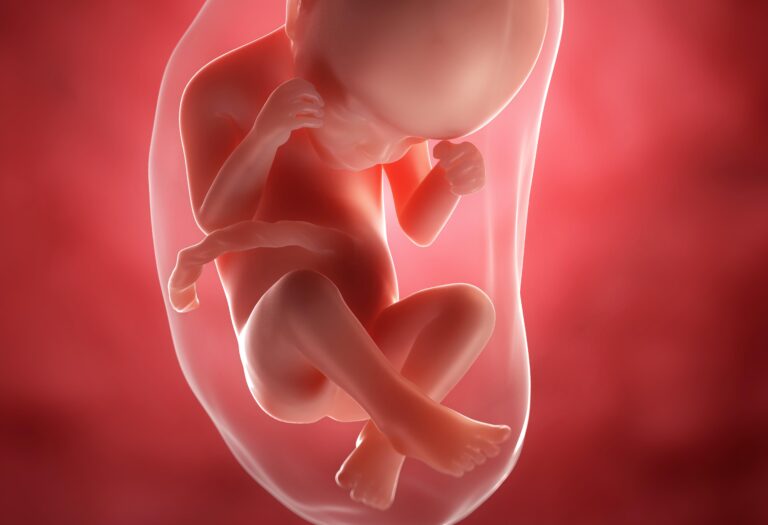24 weeks pregnant: Pregnancy Symptoms & Baby Development
Read time: 4 minutes
24 weeks pregnant is how many months?
Month 6 (Trimester 2)
Baby development at 24 week
All that breathing practice comes in handy for your baby.
Pregnancy at 24 weeks
We take a closer look at how insulin is affecting your blood sugar.
Diet & nutrition
We explore iodine, the intelligent nutrient.
Baby development at 24 weeks

What does my baby look like? And, what size is my baby?
In week 24 of pregnancy, your baby is around 21cm long from the crown of its head to its bottom, roughly the same size as an ear of corn, only heavier. It should weigh around 600g.1,2
Your baby is pretty much complete now, if a little on the skinny side. He or she will continue to plump out over the coming weeks. Your baby also now has all their facial features, including eyebrows and eyelashes – they may even have some wisps of hair growing.
A substance called ‘surfactant’ is appearing inside your baby’s lungs. It helps keep the tiny air sacs in his or her lungs (alveoli) open. Your baby has been practicing breathing since around week 17 so, if they were to arrive prematurely, they’d have a good chance of surviving and breathing without the aid of a neonatal unit.
Your baby will become a little less acrobatic due to their size. That said, they still have a tactile relationship with their surroundings and you’ll continue to feel, and even see, your baby move, roll, kick and stretch.
Pregnancy at 24 weeks (second trimester)
What’s happening in my body?
You should be showing and growing now. Or should you? Every pregnancy is different: some mums-to-be start showing early, while others can go their entire term with a barely-noticeable bump. What’s important is that you listen to your doctor or midwife, and (while it can be difficult) ignore people telling you how things ‘should be’. Even if they’re a parent themselves, their pregnancy was unique to them, as yours is to you.
You should also keep an eye on your insulin levels. Insulin is a hormone that regulates blood sugar levels and if you don’t have enough, your blood-sugar can become extremely high.
Low insulin levels can also lead to gestational diabetes, which can cause problems for your and your baby. This is why most women are offered a Glucose Tolerance Test between now and week 28. Talk to your doctor or midwife for more details.
Certain groups of women are more at risk of developing gestational diabetes than others. These include women with a Body Mass Index (BMI) of 30 or higher and women from South Asia, the Middle East or Afro-Caribbean heritage.
Pregnancy symptoms at 24 weeks

Braxton-Hicks contractions
Braxton-Hicks contractions, also known as ‘false labour pains’ happen when the womb contracts and relaxes. It’s your body’s way of ‘rehearsing’ for birth and not something to worry about. They become more apparent in the second and third trimesters.
Headaches
Those hormones are the likely culprits. Paracetamol is usually safe to take during pregnancy, but always at the lowest effective dose, and for the shortest possible time.
Breast tenderness
Your breasts may become larger and feel sore. You may also find your nipples stick out more than usual and darken in colour as your body begins to prepare for breastfeeding.
Stretch marks
As your belly grows, you may see the appearance of stretch marks on your stomach or breasts. They usually become much less noticeable after birth. Don’t waste money on ‘miracle creams’ – simple moisturiser is enough.
Swollen ankles, hands and feet
Your body holds more water while you’re pregnant, so if you stand for too long gravity will take a toll and send the water to your ankles, hands and feet. Put your feet up – right up: prop them up so they’re higher than your heart for an hour each day.
Indigestion and heartburn
These digestive problems are caused by your baby growing into some of the space your stomach occupies, and your changing hormones.
Focus on Iodine
You can think of iodine as fuel for your baby’s brain as studies have shown it can increase a baby’s IQ11, and even lead to improved lifelong wellbeing.
However, mild iodine deficiency may be common among and pregnant women, and research from the University of Surrey and University of Bristol suggests that even mild pregnancy iodine deficiency may be associated with poorer cognitive function.
Thankfully, most mums-to-be can get enough iodine from a well-balanced diet. White fish is the richest natural source, and dairy products including yogurt and cow’s milk are also rich in iodine.
However, iodine from dairy produce varies from season to season, which can affect how much iodine is in your diet. Milk produced in winter, when cows are fed on winter feed rations, contains more iodine. During summer, lower levels have been measured

Speak with your doctor or midwife about taking an iodine supplement. If you’re already getting enough iodine in a well-balanced diet, then it’s unlikely you’ll need a supplement, and too much iodine can be harmful to your baby.
Because the best sources of iodine are animal-based, vegetarians and vegans may be at a higher risk of deficiency.
THE
SCIENCE
BEHIND
IODINE
Powered by Nutricia
It’s easy to feel confused by iodine. On one hand, mild to moderate deficiency can lead to poor cognitive function in a baby. On the other hand, too much iodine is also bad for you and your baby. It’s a delicate balancing act.
Your body needs iodine to make thyroid hormones, which influence normal cell function and bodily processes such as your heart rate and metabolism. During pregnancy, your baby’s cells also rely on your iodine intake, including the cells in their rapidly developing brain.
All women need at least 0.14mg of iodine a day. The World Health Organisation suggests pregnant women take 0.25mg daily. If you’re worried about your iodine levels, speak to your doctor or midwife who may suggest taking supplements.
